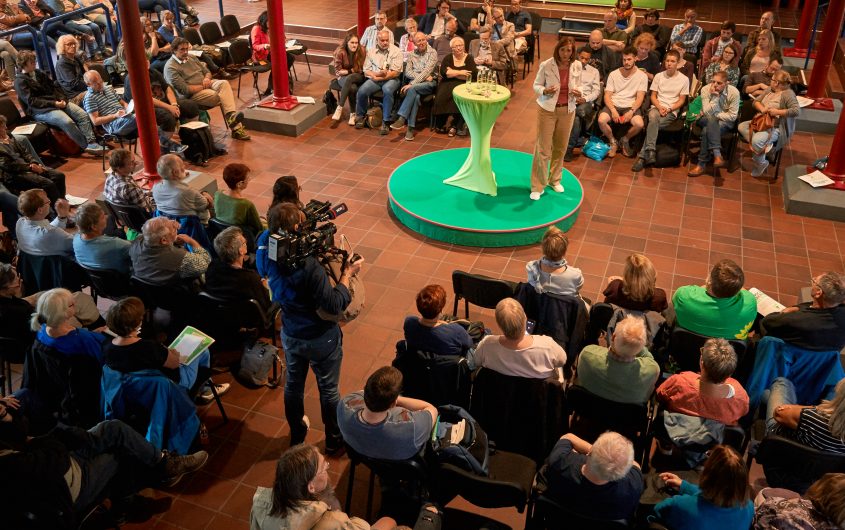
Bündis 90/Die Grünen via Flickr
Beyond Elections’ Digital Propaganda: Need for Improvement of Public Debates

Nad'a Kovalcikova
Alliance for Securing Democracy
Nad’a Kovalcikova is a program manager at the Alliance for Securing Democracy in GMF's Brussels office. While working on ASD’s European outreach, she also focuses on transatlantic cooperation, NATO, EU-U.S. relations, and emerging security challenges. In addition, she analyzes information operations, efforts to counter disinformation, and threats to democracy. She has developed her expertise through working at NATO, the European Parliament, French and Canadian embassies, American Field Service, and several NGO and think thank projects in Belgium, Canada, France, and Slovakia. Nad’a Kovalcikova obtained her PhD in international relations with a focus on security threats, and master’s degrees in politics and government, European affairs, and international economic relations. In addition to being a native speaker of Slovak, she is fluent in English, French, and Czech, speaks Spanish, and has a basic knowledge of German.
Since the beginning of the twenty-first century, we have been increasingly facing non-military threats, including digital disinformation campaigns, which have a world-wide effect. In the context of national and international security, we can consider disinformation and hostile digital propaganda as acute, asymmetrical, chaotic, and multi-polar threats. The cyber world is the new frontier, the new battle space for serious competition between state actors as well as non-state actors. The techniques that can be performed in the digital information space—collecting big data, espionage, influencing voting behavior, extorting information, destroying trust, echo chambering, and propagating false information and other actions—undermine a democracy. Such activities offer key advantages to the perpetrator. They are hard to attribute, relatively inexpensive, and potentially crippling to the intended target and beyond. There are numerous examples of state actors achieving geopolitical objectives by using these techniques. These include: cyber operations during the Russian Federation’s illegal annexation of Crimea in 2014; pro-Kremlin disinformation and cyberattacks that crippled the Central Election Commission during the 2014 presidential election in Ukraine; multi-pronged interference in the 2016 U.S. presidential elections that shook political debates to their core; the 2018 Skripal affair in Great Britain, which revealed the use of a scandalous combination of asymmetric tools; and other incidents undermining democratic values and stability. In order to engage publics more and more systematically and to help them be better equipped against disinformation, public discourse must be improved. This article is focused on disinformation in cyber space and ideas on how to counter it. It argues that even though more attention is given to discussing foreign interference and digital disinformation before elections, it is critical to continue raising awareness, fostering a healthy public discourse, and encouraging further development of deterrence and defense measures beyond elections. Subsequently, if done in a coordinated manner between state and non-state actors, this will lead to a stronger societal resilience and enhance democratic principles within and beyond national borders.
Elections and Beyond
Prior to the November 2018 U.S. midterm elections, there were again concerns over potential foreign meddling through hacking attempts of election infrastructure, including allegations of attempted voter purging in voter registration databases. However, a comprehensive overview of observed irregularities is difficult to deliver as post-election audits, which are the purview of the states, cannot be legislated by the U.S. federal government. Also, if evidence exists, it may be revealed only later in time. In the U.S. Intelligence Community report issued following the midterm elections, National Intelligence Director Dan Coats stated that there was no intelligence reporting indicating that the Russian government or others compromised election infrastructure. Nevertheless, he also stated that “Russia, and other foreign countries, including China and Iran, conducted influence activities and messaging campaigns targeted at the United States.”
Modern information operations are less discrete attacks and more a steady set of activities pushing negative and conspiratorial content with the aim of causing distrust in democratic institutions and a loss of faith in the notion of the truth.
Yet, elections do not tell the whole story. Modern information operations are less discrete attacks and more a steady set of activities pushing negative and conspiratorial content with the aim of causing distrust in democratic institutions and a loss of faith in the notion of the truth. Disinformation is, however, not only interference in democratic processes like elections. It is also interference into citizens’ minds to undermine the trust and confidence in democratically-elected governments, in media, and in integrity and values of democracies through relentless and continuous efforts that start long before the elections. Completely eliminating digital disinformation in an open information space is, however, extremely difficult due to the challenges of recognizing whether a piece of material is factual, semi-factual, or an outright falsehood. Nevertheless, ambiguous pieces of material digitally spread across social media cannot be automatically regulated by social media companies, and such measures could limit freedom of expression, one of the fundamental values of democratic systems, which must be protected.
Identifying Patterns to Counter Disinformation
Disinformation efforts exploit internal fragments and further amplify already existing divisions within a democratic society. The Alliance for Securing Democracy’s Authoritarian Interference Tracker looks at five interconnected tools used across the transatlantic community by authoritarian regimes, including information operations, cyberattacks, cooption of political parties and advocacy groups, state economic coercion, and malign finance, which the regimes use to amplify those existing divisions. Creating defenses against foreign interference activities is nevertheless incumbent on all citizens and all sectors of democratic societies. It is crucial to develop enhanced capacity to identify disinformation within a wider context of foreign interference and have access to tools to counter it without censoring information. There needs to be more focus on patterns of behavior of those who seek to manipulate the information space and hijack public debate than on censoring the content they generate and/or amplify.
There needs to be more focus on patterns of behavior of those who seek to manipulate the information space and hijack public debate than on censoring the content they generate and/or amplify.
One of the solutions is to enhance digital social listening to conduct a thorough analysis of content online to identify patterns of behavior in order to collect threat intelligence and share identified incidents to expose a malign actor. Another solution, for example, is greater engagement with grassroots activist communities and social groups that are often targeted in disinformation campaigns. They need to be deputized with the skills to identify and respond to foreign interference within their communities in order to build broader societal resilience.
There is a rising trend of democratic dissatisfaction by citizens across the Western world, illustrated by Brexit, the “gilets jaunes,” and the increasing action of social movements in the U.S. The goal of a democratic society is to pay attention to the grievances of citizens. If the citizen dissatisfaction and decreasing support for democratic principles are not tackled in a timely manner, disinformation is likely to continue to be effective.
Healthy Public Debate
Building on Bret Schafer’s analysis in an AGI publication last year suggesting policymakers should attempt “to address the real-world issues that disinformation seeks to exploit,” further attention on disinformation should focus on the encouragement of a lively evidence-based political debate, where political disagreements are treated as taking place between rivals, rather than enemies. The role of civil society in this context is central in connecting political institutions and governments with citizens. Therefore, policymakers should further emphasize the need to constantly improve public discourse, proactively frame fact-based debates, and not accept false or semi-false narratives as an acceptable premise to work with.
The challenge is to have a relevant and evidence-based debate.
Injecting disinformation into national democratic systems is, however, not a new phenomenon. The central strategy and goal to counter disinformation is to develop a healthy public discourse that systemically marginalizes fake as well as deliberately polarizing, misleading, and extreme content. The healthier the public debate is, the less likely it is that citizens will be manipulated into believing information that has been created or narrated to create distrust and spread propaganda. However, the challenge is to have a relevant and evidence-based debate. We must not allow the recycling of false information in our information-saturated political and social ecosystems, which are vulnerable and can be exploited by foreign interference. For example, in 2017, Russian government operatives injected disinformation into the German information space to promote far-right political parties supportive of the Kremlin’s agenda. This included spreading false allegations about criminal migrant activities in order to play with emotions and anti-immigrant sentiments and thus increase internal societal cleavages within Germany with digital spillover effects beyond national borders.
To help develop greater societal resilience to disinformation by authoritarian regimes, we also need to enhance coordination, improve deterrence, increase resilience, and strengthen ethics. Stronger partnerships between international organizations should be complemented by improved coordination mechanisms between governments and civil society and citizens with issue-based concerns and grievances about disinformation. This includes the most vulnerable older voters, educators who teach the youngest generation of future voters, and representatives of the private sector, particularly in social media platforms. Strengthened coordination between all stakeholders of democratic societies would help prevent the spread of disinformation and help ensure that emerging technologies cannot be exploited to undermine democracy or regulate content. Sweden’s recent information campaign prior to its parliamentary elections in September 2018 illustrated that thorough two-year governmental preparations were indispensable to improve deterrence and better secure the country from foreign attempts to influence the elections through disinformation. Other countries noted the lessons learned and, together with coordination activities outlined in the recent EEAS Action Plan introduced on December 5, 2018, are keen to improve their deterrence. Swedish experience and EEAS coordinating efforts may help EU governments follow best practices and continuously raise awareness and expose foreign interference domestically, as well as beyond their borders, in a coordinated manner by sharing their experience and building on it. This will also contribute to greater societal resilience throughout globalizing society. Building resilience is part of a long-term effort, beyond election spikes of disinformation activities. It includes enhanced media literacy and other skills critical for life in a world of growing cyberspace, which will assist voters in resisting disinformation techniques. Furthermore, media outlets should systematically verify sources and the veracity of information they disseminate, which should lead to a better practice of ethics in media and help counter the menacing spread of weaponized information that leads to the exacerbation of existing societal and political cleavages.
Conclusion
Disinformation and foreign meddling are not only about Russia; it is also about democracy. It is critical to work relentlessly to build defenses and strategically define tools to be implemented, as well as improve public debates to marginalize propaganda. This is all the more important as we approach the May 2019 European Parliament elections, which will heavily influence the direction of the EU as a whole, or any elections where voters’ behavior can be manipulated, and electoral systems cyberattacked. Evidence-based debates and a healthy public discourse empower all those who continue to engage in democratic processes and help strengthen societal democratic values and geopolitical stability beyond the momentum of elections.
The views expressed in this article are the views of the author alone.









